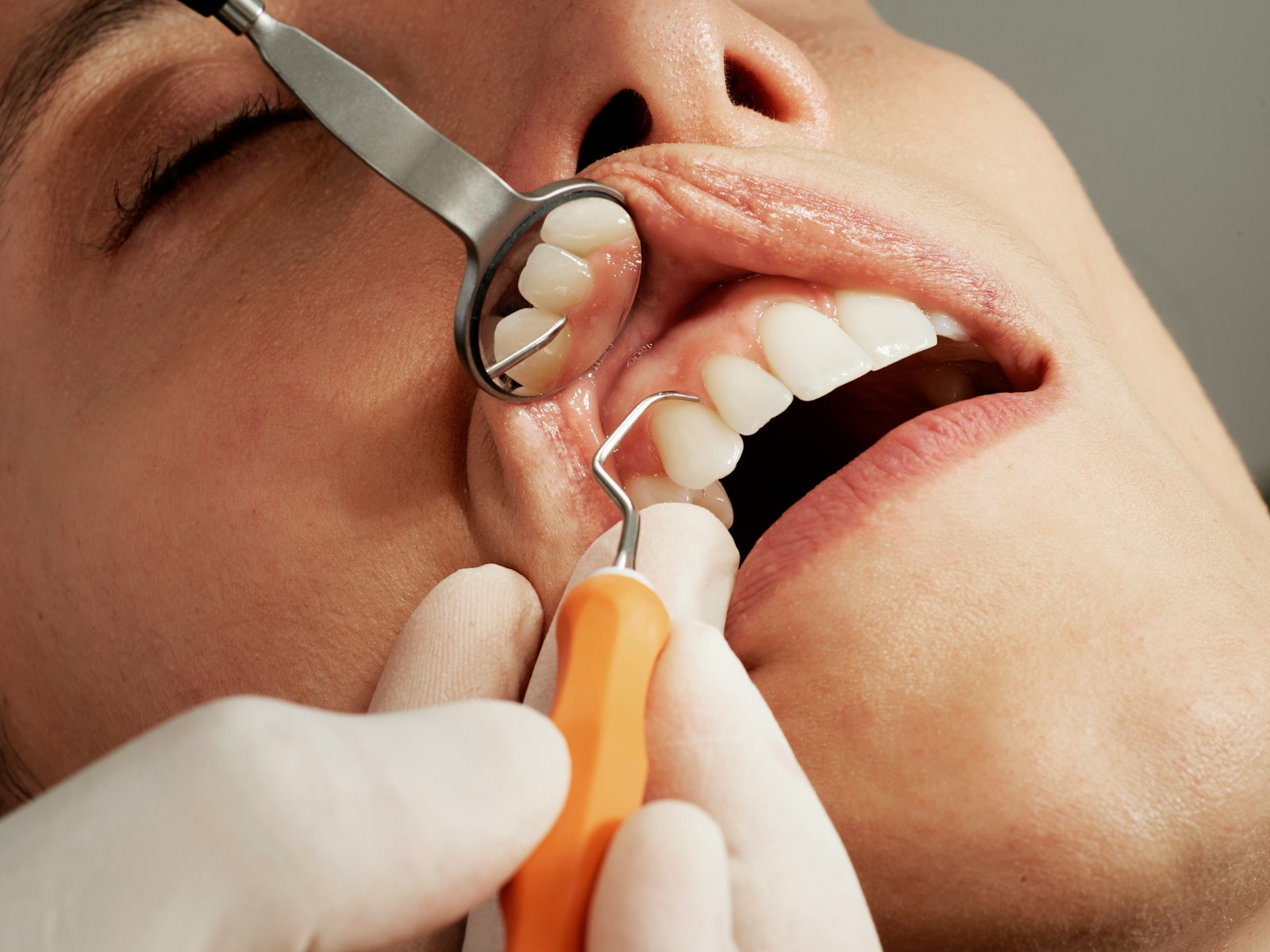Benefits of Proper Oral Hygiene in Preventing Tonsil Stones
When it comes to maintaining good oral health, most people focus on preventing cavities and gum disease. However, an often overlooked aspect of oral hygiene is the prevention of tonsil stones. Tonsil stones, or tonsilloliths, are small, calcified formations that can develop in the crevices of the tonsils. They are typically white or yellowish in color and can cause discomfort, bad breath, and a persistent sore throat. By incorporating proper oral hygiene practices into your daily routine, you can significantly reduce the risk of developing tonsil stones.
One of the key benefits of practicing good oral hygiene is that it helps control the buildup of bacteria and debris in the mouth. This buildup, if left unchecked, can contribute to the formation of tonsil stones. By brushing your teeth at least twice a day with a soft-bristled toothbrush and using an antibacterial mouthwash, you can effectively remove food particles, dead cells, and other debris that may accumulate in the mouth and contribute to tonsil stone formation.
Furthermore, regular flossing is crucial in preventing tonsil stones as it helps remove the food particles and plaque that can get trapped between teeth and gums. This reduces the likelihood of bacteria migrating to the tonsils and forming tonsil stones.
Another important aspect of oral hygiene is maintaining proper hydration. Drinking an adequate amount of water throughout the day not only keeps your mouth moist and prevents dryness, but it also helps flush out bacteria and food particles that can contribute to the formation of tonsil stones. Staying hydrated also promotes saliva production, which has natural antibacterial properties that can help control the growth of bacteria in the mouth.
In addition to these practices, regularly cleaning your tongue is crucial for maintaining oral hygiene. The surface of the tongue can harbor bacteria that can migrate to the tonsils and contribute to tonsil stone formation. Using a tongue scraper or simply brushing your tongue gently with your toothbrush can help remove bacteria and reduce the risk of tonsil stone formation.
Practicing proper oral hygiene not only helps to prevent common oral health issues but also plays a vital role in reducing the occurrence of tonsil stones. By incorporating regular brushing, flossing, tongue cleaning, and staying hydrated, you can significantly reduce the buildup of bacteria and debris in the mouth, ultimately minimizing the risk of tonsil stone development. Remember, preventive measures are always better than dealing with the discomfort and inconvenience that tonsil stones can cause.
Signs and Symptoms of Tonsil Stones
Tonsil stones, also known as tonsilloliths, are small, white or yellowish deposits that form on the tonsils. These stones are made up of debris, including dead cells, mucus, food particles, and bacteria, that get trapped in the crevices of the tonsils. While tonsil stones are usually harmless, they can cause certain discomforts and indicate underlying issues. Here are some common signs and symptoms to look out for if you suspect you may have tonsil stones:
- Bad Breath: One of the most noticeable and persistent symptoms of tonsil stones is bad breath, also known as halitosis. The stones can release a foul-smelling odor due to the accumulation of bacteria and decaying matter. Proper oral hygiene, such as regular brushing, flossing, and using mouthwash, may help mask the odor, but it will not eliminate the root cause.
- Sore Throat: Tonsil stones can cause a persistent sore throat, especially if they are large in size or located in a position that irritates the tonsils. This can make it uncomfortable to swallow or speak. If you experience frequent sore throats without any other apparent cause, it may be worth checking for tonsil stones.
- Difficulty Swallowing: As tonsil stones grow in size or get lodged in a particular spot, they can create a sensation of something being stuck in the throat. This can make swallowing more challenging and uncomfortable.
- Tonsil Irritation and Tenderness: Tonsil stones can lead to inflammation and irritation of the tonsils, causing them to become red, swollen, and tender. You may experience discomfort or a sensation of a foreign body in your throat.
- White Debris or Spots: Tonsil stones often appear as small, white or yellowish lumps on the surface of the tonsils. These stones can vary in size, ranging from tiny grains to larger formations. Sometimes, they may not be visible to the naked eye but can be felt as small, hard protrusions.
It is important to note that these symptoms can also be associated with other conditions, such as tonsillitis or throat infections. If you suspect you have tonsil stones or experience persistent symptoms, it is advisable to consult with a healthcare professional for an accurate diagnosis and appropriate treatment.
To prevent tonsil stones from recurring, practicing good oral hygiene is crucial. Regularly brushing your teeth, using a tongue scraper to remove bacteria from the surface of the tongue, and gargling with saltwater can help reduce the risk of tonsil stone formation. Additionally, staying hydrated and avoiding the consumption of excessive dairy products and sugary foods may also play a role in preventing the development of tonsil stones.
Being aware of the signs and symptoms of tonsil stones can help you identify and address the issue promptly. If you experience persistent symptoms, seek medical advice to determine the underlying cause and establish an appropriate treatment plan. Remember to prioritize consistent oral hygiene practices to minimize the chances of tonsil stone formation in the future.
Effective Natural Remedies to Get Rid of Tonsil Stones
Tonsil stones, also known as tonsilloliths, are small, calcified deposits that form in the crevices of the tonsils. They can cause discomfort, bad breath, and in some cases, affect the overall oral hygiene. While medical treatments are available for removing tonsil stones, many people prefer to explore natural remedies before considering more invasive options. Here are some effective natural remedies that can help you get rid of tonsil stones.
- Saltwater gargle: Gargling with warm saltwater is a simple yet effective remedy for tonsil stones. Salt helps to neutralize the acidic environment in the mouth, making it difficult for bacteria to thrive. Mix half a teaspoon of salt in a cup of warm water and gargle for 15-30 seconds, focusing on the back of your throat. Repeat this process several times a day to reduce inflammation and dislodge tonsil stones.
- Apple cider vinegar: Known for its antimicrobial properties, apple cider vinegar can help eliminate the bacteria responsible for tonsil stone formation. Mix a tablespoon of apple cider vinegar with a glass of warm water and gargle with it twice a day. This can assist in dissolving the tonsil stones and prevent their recurrence.
- Oil pulling: Oil pulling is an ancient Ayurvedic practice that involves swishing oil in the mouth to remove toxins and bacteria. Coconut oil and sesame oil are popular choices for oil pulling. Take a tablespoon of oil and swish it around in your mouth for 10-15 minutes, making sure to reach the back of your throat. Spit it out and rinse your mouth thoroughly. This practice can help dislodge tonsil stones and improve oral health.
- Onions and garlic: Both onions and garlic are known for their strong antimicrobial properties. Chewing on raw onion or garlic can help kill the bacteria that contribute to tonsil stone formation. You can also incorporate them into your regular diet to maintain good oral hygiene and prevent further buildup of tonsil stones.
- Probiotics: probiotics into your diet can promote a healthy balance of bacteria in your mouth and throat. Probiotics can be found in yogurt, kefir, sauerkraut, and other fermented foods. They help in reducing the formation of tonsil stones and improve overall oral health.
It is important to note that these natural remedies may provide relief for mild to moderate cases of tonsil stones. If your condition persists or worsens, it is advisable to seek medical advice. Your doctor may recommend other alternative treatments or suggest removing the tonsils altogether if conservative measures fail to provide relief.
By implementing these natural remedies, you can take control of your oral health and get rid of tonsil stones naturally. Remember to maintain a good oral hygiene routine, including regular brushing, flossing, and tongue scraping, as prevention is always better than cure.
Medical Treatments for Removing Tonsil Stones
Tonsil stones, also known as tonsilloliths, are small, calcified deposits that form in the crevices of the tonsils. While there are several natural remedies to get rid of tonsil stones, sometimes medical intervention is necessary. In this article, we will explore the medical treatments available for removing tonsil stones.
Tonsil Stone Removal Using Curettage:
One of the common medical treatments for removing tonsil stones is curettage. This procedure involves the physical removal of the tonsil stones using a specialized instrument called a curette. A healthcare professional will use a curette to gently scrape the tonsils and dislodge the stones. This procedure is usually performed under local anesthesia and is considered safe and effective in removing stubborn tonsil stones.
Laser Tonsil Cryptolysis:
Another medical treatment option is laser tonsil cryptolysis. This procedure utilizes a laser to reshape the surface of the tonsils, making it more difficult for tonsil stones to form. The laser energy is applied to the tonsil crypts, which are the crevices where tonsil stones tend to develop. Laser tonsil cryptolysis is an outpatient procedure that can be performed under local anesthesia. It offers a minimally invasive option for individuals who experience recurrent tonsil stones.
Tonsillectomy:
In severe cases, a tonsillectomy may be recommended as a treatment option for persistent tonsil stones. A tonsillectomy involves the complete removal of the tonsils. This surgical procedure is typically performed under general anesthesia and may require a few days of recovery. Tonsillectomy is a more invasive option and is usually considered when other treatments have failed or when the tonsils themselves are causing other health issues.
Preventive Measures:
After undergoing medical treatments for tonsil stone removal, it is essential to take preventive measures to avoid their recurrence. Good oral hygiene practices, such as regular brushing and flossing, can help prevent the formation of tonsil stones. Additionally, gargling with saltwater or a water and vinegar solution can help keep the tonsils clean and reduce the likelihood of tonsil stone formation. It is also important to avoid smoking and any other factors that may contribute to the development of tonsil stones.
While natural remedies can be effective in getting rid of tonsil stones, medical treatments may be necessary in certain cases. Curettage, laser tonsil cryptolysis, and tonsillectomy are some of the medical treatments available for removing tonsil stones. Remember to consult with a qualified healthcare professional to determine the most suitable treatment option for your specific situation.
Preventive Measures to Avoid the Recurrence of Tonsil Stones
Tonsil stones, also known as tonsilloliths, are small formations that develop on the tonsils. They can cause discomfort and bad breath. While there are various ways to get rid of tonsil stones, preventing their recurrence is equally important. By incorporating a few preventive measures into your daily routine, you can significantly reduce the chances of developing tonsil stones again.
Maintain Proper Oral Hygiene
One of the most effective ways to prevent the recurrence of tonsil stones is to maintain proper oral hygiene. This involves brushing your teeth at least twice a day with a fluoride toothpaste and using a tongue scraper to clean your tongue. Additionally, flossing daily helps to remove any food particles and bacteria that may contribute to the formation of tonsil stones.
Rinse Your Mouth Regularly
Rinsing your mouth regularly with an antibacterial mouthwash or saltwater solution can help prevent the buildup of bacteria and debris. Gargling with warm saltwater after meals can also aid in dislodging any trapped food particles that may lead to the formation of tonsil stones.
Avoid Certain Foods
Some foods, like dairy products and sugary treats, can contribute to the growth of tonsil stones. Dairy products, particularly milk, can promote mucus production, which can lead to the formation of tonsil stones. Avoiding excessive consumption of these foods can help prevent the recurrence of tonsil stones.
Stay Hydrated
Drinking plenty of water throughout the day can help keep your mouth moist and prevent the accumulation of bacteria and debris. Adequate hydration also promotes saliva production, which is essential in flushing out potential irritants and preventing the formation of tonsil stones.
Quit Smoking
Smoking not only damages your overall health but also increases the likelihood of developing tonsil stones. The chemicals in tobacco products can irritate the tonsils and promote the growth of tonsil stones. Quitting smoking or avoiding exposure to secondhand smoke can significantly reduce the risk of tonsil stone recurrence.
Regular Dental Check-ups
Regular visits to your dentist are crucial in preventing the recurrence of tonsil stones. Your dentist can examine your oral health, identify any underlying issues, and provide appropriate guidance to maintain a healthy mouth. They may also recommend professional cleanings to remove any plaque or tartar build-up, which can contribute to the development of tonsil stones.
By following these preventive measures, you can minimize the chances of tonsil stone recurrence and maintain a healthier oral environment. Remember, if you experience persistent or severe symptoms, consult with a healthcare professional for a proper diagnosis and guidance.
Conclusion
Maintaining proper oral hygiene is crucial in preventing the onset and recurrence of tonsil stones. By regularly brushing and flossing, individuals can minimize the buildup of bacteria and debris in the mouth, reducing the likelihood of tonsil stone formation. Additionally, using mouthwashes and gargling with saltwater can help to cleanse the tonsils and eliminate any potential pockets or crevices where stones may form. Developing and sticking to a consistent oral hygiene routine is the first line of defense against tonsil stones.
Recognizing the signs and symptoms of tonsil stones is essential for early detection and treatment. These include bad breath, a sore throat, difficulty swallowing, and the sensation of a foreign object stuck in the throat. By being aware of these indications, individuals can take prompt action to address tonsil stones and prevent them from becoming more severe or causing discomfort. Regular self-checks of the tonsils for the presence of white or yellowish stones can also facilitate early intervention.
When it comes to natural remedies, there are several options available to help eliminate tonsil stones. Gargling with warm saltwater or mouthwash can reduce inflammation and dislodge smaller stones. Using a water flosser or gently scraping the tonsils with a cotton swab or toothbrush can also aid in the removal of stones. Additionally, consuming probiotic-rich foods, such as yogurt or kefir, can promote a healthy balance of bacteria in the mouth and prevent the formation of tonsil stones.
In cases where natural remedies prove ineffective or tonsil stones are recurrent, medical treatments may be necessary. One such option is tonsillectomy, the surgical removal of the tonsils. This procedure is typically reserved for severe cases or individuals who experience frequent tonsil stone formation. Alternatively, a doctor may recommend laser cryptolysis, a minimally invasive procedure that uses laser technology to eliminate the pockets in which tonsil stones develop.
To prevent the recurrence of tonsil stones, individuals should adopt certain preventative measures. Firstly, maintaining good oral hygiene practices, such as brushing the teeth and tongue twice daily, flossing regularly, and using an antibacterial mouthwash, is crucial. Additionally, staying hydrated can help flush out debris and bacteria that contribute to tonsil stone formation. Avoiding or minimizing the consumption of dairy products can also reduce the production of mucus, which can contribute to the development of tonsil stones.
By prioritizing proper oral hygiene, recognizing the signs and symptoms of tonsil stones, utilizing natural remedies, exploring medical treatments when necessary, and implementing preventive measures, individuals can effectively manage and prevent tonsil stones. With a proactive approach and consistent care, individuals can enjoy improved oral health and a reduction in the occurrence of tonsil stones, promoting overall well-being and fresh breath.
Originally posted 2024-02-03 15:31:37.




